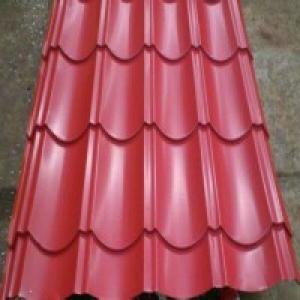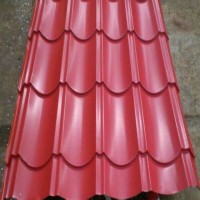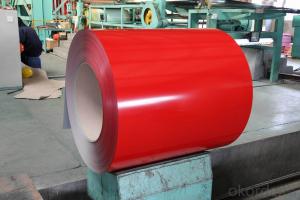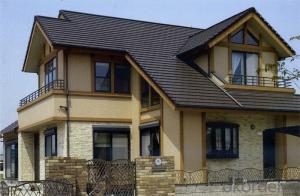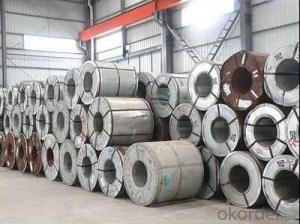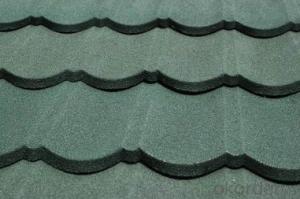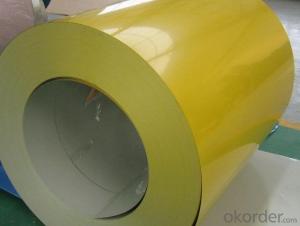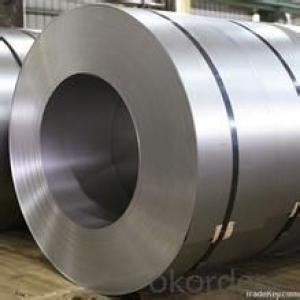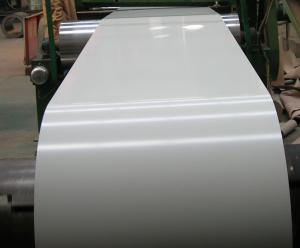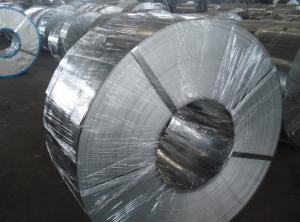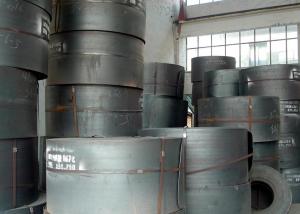Colour Coating Painted Galvanized/Gavalume Steel Tile
- Loading Port:
- China Main Port
- Payment Terms:
- TT or LC
- Min Order Qty:
- -
- Supply Capability:
- -
OKorder Service Pledge
OKorder Financial Service
You Might Also Like
Colour Coating Painted Galvanized/Gavalume Steel Tile
1.Structure of Colour Coating Painted Galvanized/Gavalume Steel Tile
1. Colour Coating Painted Galvanized/Gavalume Steel Tile with organic layer, which provides higher anti-corrosion property and a longer lifespan than that of galvanized steel sheets.
2. Colour Coating Painted Galvanized/Gavalume Steel Tile consist of cold rolled, HDG electro-galvanized and hot-dip alu-zinc coated steel. The finish coats of Color Coated Steel Coil can be classified into groups as follows: polyester, silicon modified polyesters, polyvinylidene fluoride, high-durability polyester, etc.
3. The production process has evolved from one-coating-and-one-baking to double-coating-and-double-baking, and even three-coating-and-three-baking.
4. Colour Coating Painted Galvanized/Gavalume Steel Tile has a very wide selection, like orange, cream-colored, dark sky blue, sea blue, bright red, brick red, ivory white, porcelain blue, etc.
5. Colour Coating Painted Galvanized/Gavalume Steel Tile can also be classified into groups by their surface textures, namely regular prepainted sheets, embossed sheets and printed sheets.
2.Main Features of Colour Coating Painted Galvanized/Gavalume Steel Tile.
1) Rust-proof
2) Water-proof
3)Durable using
3. Colour Coating Painted Galvanized/Gavalume Steel Tile Images
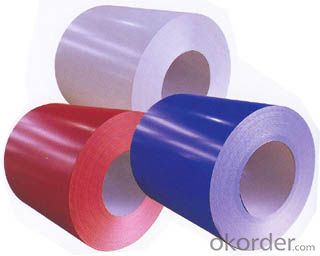
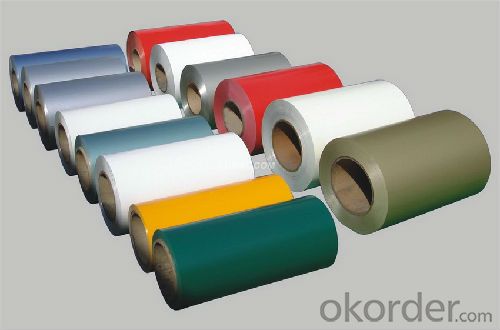
4. Colour Coating Painted Galvanized/Gavalume Steel Tile Specification
1)Based raw material: Hot rolled steel coils or Cold rolled steel coils
2) Thickness
3) Width
4)Coating mass
5) Spangle
6)Surface treatment
7)Coil inner diameter
8)Painting kind
9)Painting color
10)Painting thickness
Detail information:
1: Size: 0.15-1.2mm*600-1250mm
2: Paint: Top side: 15-25um, Back side: 5-9um, or according to customer’s order.
3: Base material: Hot dipped galvanized steel coil, GL
4: Zinc coating: 60g-275g.
5: Coil weight: 3-6tons
6: Coil ID: 508mm
7: Color: Any color.
8: Standard: ASTM, GB, JIS
9:Grade: CGCC,CGCH,SGCC, DX51D and ASTM
10:Surface Treatments: skin passed, chromated, oiled and antifinger
11: Approved Certificate: SGS / ISO9001 / BV
12: Package Method: Vertical/Horizontal, full wrapped with anti-moist paper inside, iron sheet (sea worthy)
13: Payments terms: T/T ,L/C,etc.
5.FAQ of Colour Coating Painted Galvanized/Gavalume Steel Tile
We have organized several common questions for our clients,may help you sincerely:
①How about your company?
A world class manufacturer & supplier of castings forging in carbon steel and alloy steel,is one of the large-scale professional investment casting production bases in China,consisting of both casting foundry forging and machining factory. Annually more than 8000 tons Precision casting and forging parts are exported to markets in Europe,America and Japan. OEM casting and forging service available according to customer’s requirements.
②How to guarantee the quality of the products?
We have established the international advanced quality management system,every link from raw material to final product we have strict quality test;We resolutely put an end to unqualified products flowing into the market. At the same time, we will provide necessary follow-up service assurance.
③How is the packaging and delivery?
Exporting Package with the steel material cover and the delivery term is based on the project.
- Q: How do steel products contribute to sustainable development?
- Steel products contribute to sustainable development in multiple ways. Firstly, steel is one of the most recyclable materials, meaning that it can be reused indefinitely without losing its properties. This reduces the demand for raw materials and minimizes waste generation. Secondly, steel is highly durable and long-lasting, which means that products made from steel have a longer lifespan and require fewer replacements. This reduces the overall consumption of resources and energy. Additionally, steel is a key component in the construction industry, which plays a vital role in sustainable infrastructure development. Steel structures are known for their strength, flexibility, and resistance to natural disasters, making them an ideal choice for green buildings and sustainable urbanization. Lastly, the steel industry has been adopting various measures to reduce its environmental impact, such as improving energy efficiency, reducing greenhouse gas emissions, and implementing sustainable production practices. These efforts further contribute to sustainable development by minimizing the industry's carbon footprint and preserving natural resources.
- Q: How do steel products contribute to the construction of theme parks and entertainment venues?
- Steel products contribute significantly to the construction of theme parks and entertainment venues due to their durability, versatility, and strength. Steel is used in various aspects of the construction process, including the infrastructure, ride structures, and building frameworks. Its high strength-to-weight ratio allows for the creation of complex and intricate designs, ensuring the safety and stability of the structures. Additionally, steel's resistance to corrosion and extreme weather conditions makes it a reliable choice for long-lasting and low-maintenance constructions. Overall, steel products play a crucial role in bringing the thrilling and awe-inspiring experiences of theme parks and entertainment venues to life.
- Q: What are the different types of steel pipes and tubes available?
- There are various types of steel pipes and tubes available, including seamless, welded, galvanized, stainless steel, and carbon steel pipes. Each type has its own unique characteristics and is used for specific applications in industries such as construction, oil and gas, plumbing, and manufacturing.
- Q: How is steel mesh used in construction?
- Steel mesh is commonly used in construction as a reinforcement material. It is mainly used to strengthen concrete structures such as floors, walls, and foundations. The mesh is placed within the concrete to provide additional tensile strength, preventing cracks and enhancing the overall durability of the structure. Additionally, steel mesh is used in the construction of fences, barriers, and cages to provide security and containment.
- Q: How is steel rebar threaded for connecting reinforcement bars in construction?
- Steel rebar is threaded for connecting reinforcement bars in construction using a process called threading. This involves cutting precise threads onto the end of the rebar using a specialized machine. The threaded end of one rebar is then inserted into a coupler, which is a device designed to provide a secure connection. The other end of the coupler is threaded as well, and a second rebar is inserted and tightened with a wrench. This threaded connection ensures a strong and reliable bond between the reinforcement bars, enhancing the overall structural integrity of the construction project.
- Q: What are the different types of steel chains and their uses?
- There are several types of steel chains, including welded chains, roller chains, and stainless steel chains. Welded chains are commonly used for general purposes, such as securing equipment and lifting heavy loads. Roller chains, on the other hand, are designed for power transmission applications, often found in bicycles, motorcycles, and industrial machinery. Stainless steel chains, known for their corrosion resistance, are commonly used in marine environments, food processing, and medical equipment. Each type of steel chain has its own specific uses depending on the industry and application requirements.
- Q: How do steel products withstand extreme temperatures and weather conditions?
- Steel products are able to withstand extreme temperatures and weather conditions due to their inherent strength and durability. Steel has a high melting point, making it resistant to heat, and its composition allows it to maintain its structural integrity under severe weather conditions such as strong winds, heavy snow, or intense rain. Additionally, steel can be coated with protective layers such as galvanization or paint, which further enhances its resistance to corrosion and rust.
- Q: How does steel pipe coating for marine applications work?
- Steel pipe coating for marine applications works by applying a protective layer onto the surface of the steel pipe to prevent corrosion and damage caused by exposure to saltwater and other harsh environmental conditions. This coating is typically made of materials such as epoxy, polyethylene, or zinc, which provide a barrier against corrosion and extend the lifespan of the pipe. The coating process involves cleaning and preparing the pipe surface, applying the coating material through methods like spray or immersion, and then curing or drying it to form a durable and protective layer. Overall, steel pipe coating for marine applications enhances the pipe's resistance to corrosion, abrasion, and other forms of deterioration, ensuring its reliability and longevity in marine environments.
- Q: What are the safety considerations when working with steel products?
- When working with steel products, some important safety considerations include wearing appropriate personal protective equipment (PPE) such as gloves, safety glasses, and steel-toed boots to protect against cuts, burns, and impact injuries. It is also crucial to maintain a clean and organized workspace to prevent slips, trips, and falls. Additionally, workers should be trained on proper handling techniques to avoid strains or musculoskeletal injuries. Adequate ventilation and respiratory protection should be provided when necessary to protect against fumes and dust. Regular maintenance of tools and equipment is essential to prevent accidents and ensure optimal performance. Finally, following established safety protocols and guidelines, as well as being aware of potential hazards and risks associated with working with steel products, is vital for a safe working environment.
- Q: How are steel products used in the telecommunications industry?
- Steel products are used in the telecommunications industry for various purposes, including the construction of telecommunication towers, transmission lines, and underground cable systems. Steel provides the necessary strength and durability required to support the infrastructure and ensure reliable communication networks. Additionally, steel enclosures and cabinets are used to protect sensitive equipment and cables from environmental factors, ensuring their longevity and functionality.
Send your message to us
Colour Coating Painted Galvanized/Gavalume Steel Tile
- Loading Port:
- China Main Port
- Payment Terms:
- TT or LC
- Min Order Qty:
- -
- Supply Capability:
- -
OKorder Service Pledge
OKorder Financial Service
Similar products
Hot products
Hot Searches
Related keywords
